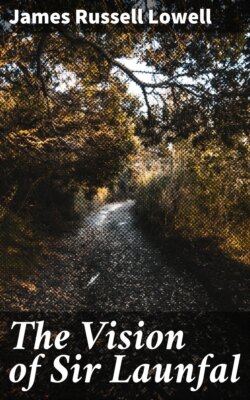Читать книгу The Vision of Sir Launfal - James Russell Lowell - Страница 11
На сайте Литреса книга снята с продажи.
VERSE AND PROSE.
ОглавлениеTable of Contents
A year in Europe, 1851–1852, with his wife, whose health was then precarious, stimulated his scholarly interests, and gave substance to his study of Dante and Italian literature. In October, 1853, his wife died; she had borne him three children: the first-born, Blanche, died in infancy; the second, Walter, also died young; the third, a daughter, Mrs. Burnett, survived her parents. In 1855 he was chosen successor to Longfellow as Smith Professor of the French and Spanish Languages and Literature, and Professor of Belles Lettres in Harvard College. He spent two years in Europe in further preparation for the duties of his office, and in 1857 was again established in Cambridge, and installed in his academic chair. He married, also, at this time Miss Frances Dunlap, of Portland, Maine.
Lowell was now in his thirty-ninth year. As a scholar, in his professional work, he had acquired a versatile knowledge of the Romance languages, and was an adept in old French and Provençal poetry; he had given a course of twelve lectures on English poetry before the Lowell Institute in Boston, which had made a strong impression on the community, and his work on the series of British Poets in connection with Professor Child, especially his biographical sketch of Keats, had been recognized as of a high order. In poetry he had published the volumes already mentioned. In general literature he had printed in magazines the papers which he afterward collected into his volume, Fireside Travels. Not long after he entered on his college duties, The Atlantic Monthly was started, and the editorship given to him. He held the office for a year or two only; but he continued to write for the magazine, and in 1862 he was associated with Mr. Charles Eliot Norton in the conduct of The North American Review, and continued in this charge for ten years. Much of his prose was contributed to this periodical. Any one reading the titles of the papers which comprise the volumes of his prose writings will readily see how much literature, and especially poetic literature, occupied his attention. Shakespeare, Dryden, Lessing, Rousseau, Dante, Spenser, Wordsworth, Milton, Keats, Carlyle, Percival, Thoreau, Swinburne, Chaucer, Emerson, Pope, Gray—these are the principal subjects of his prose, and the range of topics indicates the catholicity of his taste.
In these papers, when studying poetry, he was very alive to the personality of the poets, and it was the strong interest in humanity which led Lowell, when he was most diligent in the pursuit of literature, to apply himself also to history and politics. Several of his essays bear witness to this, such as Witchcraft, New England Two Centuries Ago, A Great Public Character (Josiah Quincy), Abraham Lincoln, and his great Political Essays. But the most remarkable of his writings of this order was the second series of The Biglow Papers, published during the war for the Union. In these, with the wit and fun of the earlier series, there was mingled a deeper strain of feeling and a larger tone of patriotism. The limitations of his style in these satires forbade the fullest expression of his thought and emotion; but afterward in a succession of poems, occasioned by the honors paid to student soldiers in Cambridge, the death of Agassiz, and the celebration of national anniversaries during the years 1875 and 1876, he sang in loftier, more ardent strains. The most famous of these poems was his noble Commemoration Ode.
